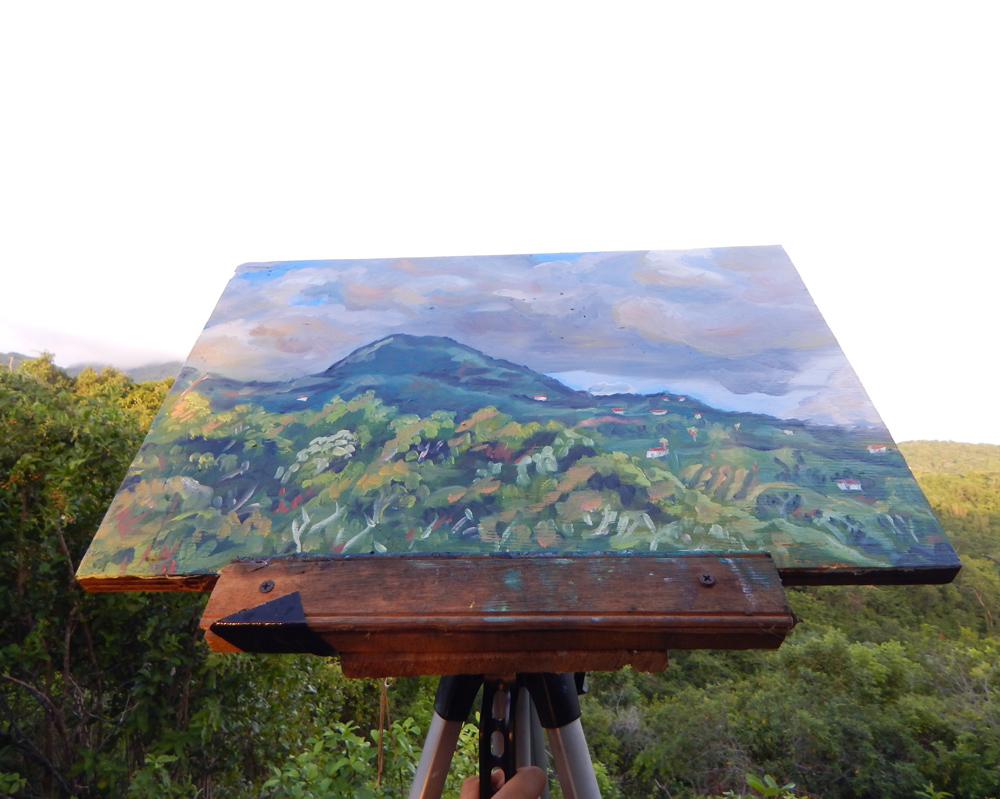I was talking with Will, a multi-talented musician friend, last night about success and getting things done.
When you are good at a range of things, sometimes it’s hard to figure out what you want to do.
He told me “it’s hard for us generalists to settle down and do one thing well.”
I like landscape painting, for instance.

I’m not amazing at it, but I’m good.
I also like recording music. I am a good songwriter.
However, I am best at writing gardening books. And that’s where my success has been.
Some years ago, sci-fi author Bruce Bethke told me that I was “good” at art and music, but that I was really good at writing.
“Any time you spend on secondary skills takes away from your primary skill, and that’s the skill that will bring you the most success,” he told me.
So I pursued writing primarily.
You have to settle down somewhere.
Though I am not convinced that you should completely abandon your secondary skills. Sometimes you can use them to bolster your primary skill, like when an author is also a good illustrator and uses his art in his books.
The main problem generalists have is a lack of focus. You can have incredible firepower but never get anything done.
When your skills are focused to a point and directed towards a target, you will succeed.
Many people talk about their plans to write a book or start a photography studio or organize their garage so they can start sewing again… yet it doesn’t happen because they don’t have focus.
Focus! Tell yourself “this week it happens – and it starts today!” Put everything else aside and stop pointing your talent all over the map.
Decide what you would like to accomplish and put your mind on it. No TV, no phone, no surfing the net, no distractions from friends. Any extra time you have gets focused on that thing that’s been eating at you, that you know you’re good at but never do.
Ready… aim… fire!


6 comments
Yes, this is true. Mr Bethke was a good friend to you.
I have “aged out” of my primary skill: singing. It’s not a pleasant state of being… but God has given me plenty of other skills to keep me busy, which comes in handy on a homestead, where generalists can find a niche. “There is a time and a purpose…”
I have totally fallen in love with your garden. I will be making some biochar later this year but can I chop up and use some charcoal in bag from the store to get started? If so what kind? PS: you are killing my back but maybe strengthen my back muscles. We will see!
The “real charcoal” in bags is probably the best. Hardwood charcoal. But it’s much cheaper to just make char in a firepit.
What does “real charcoal ” mean? What do u look for in the store? I will be making biochar in a firepit like you did but I wanted to get some in this spring. AND I was watching your video on making a compost tea, the one where you were adding beer I think and other things. But I can’t find it again.???
It’s called “hardwood charcoal” or “real charcoal” right on the bag. Hunks of charred wood, not briquettes.
I might just be rationalizing, but I think being well-rounded is an essential skill in itself. With a background in a science field and having worked for several years at a tech company before retiring to have kids and homestead, I’ve seen firsthand how people who are perhaps “over-educated” in a very specific field can get tunnel vision when it comes to applying their own discipline to the real world. Intuition is often banished completely in favor of theory and models and what the academics have determined “should” happen, while externalities and spillover effects are ignored. It’s assumed that things happening in areas outside one’s discipline are best handled by experts in that other discipline, and therefore causal relationships or correlations often go unnoticed.
These days, it seems like everyone with the rank or credentials to make any kind of major change in the world is so focused in their background (knowing “more and more about less and less” as they say) that it’s almost impossible to find “experts” in anything who are also systems-level thinkers. Therefore no one sees how different fields impact each other, and people miss critical signals that occur across disciplines that should indicate problems upstream. So they keep constructing band-aid “solutions” to problems that are really being caused by larger systems or by practices outside the field where the problems are being addressed.
I think we need more well-rounded people. I think those of us who don’t pursue one field or skill to the exclusion of all others, while we may never be leaders in the field of our “primary skill,” we can provide important insights and observations and intuition which might be helpful to people who are not fixated on the need for a lot of degrees and credentials after someone’s name in order to listen to them. Some of history’s most influential thinkers were “Renaissance Men”: Ben Franklin, Leonardo da Vinci, Pythagoras, Galileo…the list goes on.
We’ve entered an age where so much has been discovered, that it’s almost impossible to become an innovator without spending a lifetime learning everything that’s ever been discovered in a particular field so that you can take the next step. Some of today’s greatest minds are wasted spending decades learning to replicate what their predecessors have done, only to find they don’t have the generalist background needed to take the next intuitive leap, because they don’t have enough exposure to other areas to inspire them.
Comments are closed.